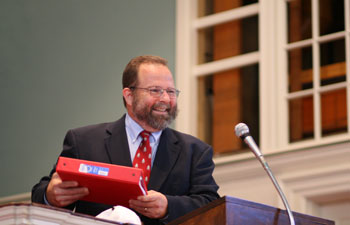 On October 5—just two months after putting off his tenure sabbatical and stepping in as the College’s new Associate Dean of Students—history professor Rick Warner was getting ready for church when he received the news that Wabash freshman Johnny Smith had died in the Delta Tau Delta house. The coroner would later rule that alcohol poisoning was the cause.
On October 5—just two months after putting off his tenure sabbatical and stepping in as the College’s new Associate Dean of Students—history professor Rick Warner was getting ready for church when he received the news that Wabash freshman Johnny Smith had died in the Delta Tau Delta house. The coroner would later rule that alcohol poisoning was the cause.
Three days after Smith’s death, Warner attended the Wednesday night meeting of the Wabash Christian Men. He wanted to reach out to the student leaders. And, as a Quaker, he also wanted to spend time "in an environment that would be spiritually supportive."
Later he sat down for a conversation with Austin Rovenstine ’10, managing editor of one of the College’s two conservative journals, and spoke about the role of faith and deliberation in a difficult time.
Some quotes from that interview:
"The Wabash community, in a sense, operates under a covenant. We have a covenantal relationship with each other, and that’s something that makes us a little different than a much larger place. I have a responsibility as a member of the community to other members of the community. And most of the time, this really works quite well here. I think we need to relax a minute, and see that it really does work quite well.
"I have great faith in the Wabash community in this regard. I have seen Wabash students unite when they needed to on many different occasions, and come together…. That’s enormously exciting to me as a person of faith because I see people engaging the Eternal Spirit, and I really believe in human potential. I think that we see that powerfully on our campus."
"I’m very bullish on the future, mostly because of who our students are.
"In my own tradition, we have a term called ‘seasoning,’ which means that if you have an idea, rather than acting on it right away, in an impetuous way, maybe it’s better to let it season a little bit, and in the end, if you get some of your other concerns out of the way—your ego, or your desires that may not be as pure—and allow and wait on God to help you think through a problem, in the end, it always works better."
Excerpted from an article in The Bachelor by Austin Rovenstine ’10.